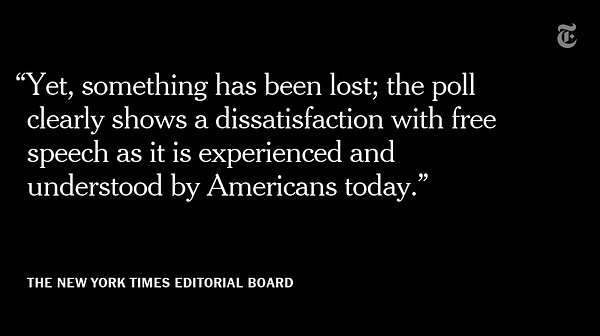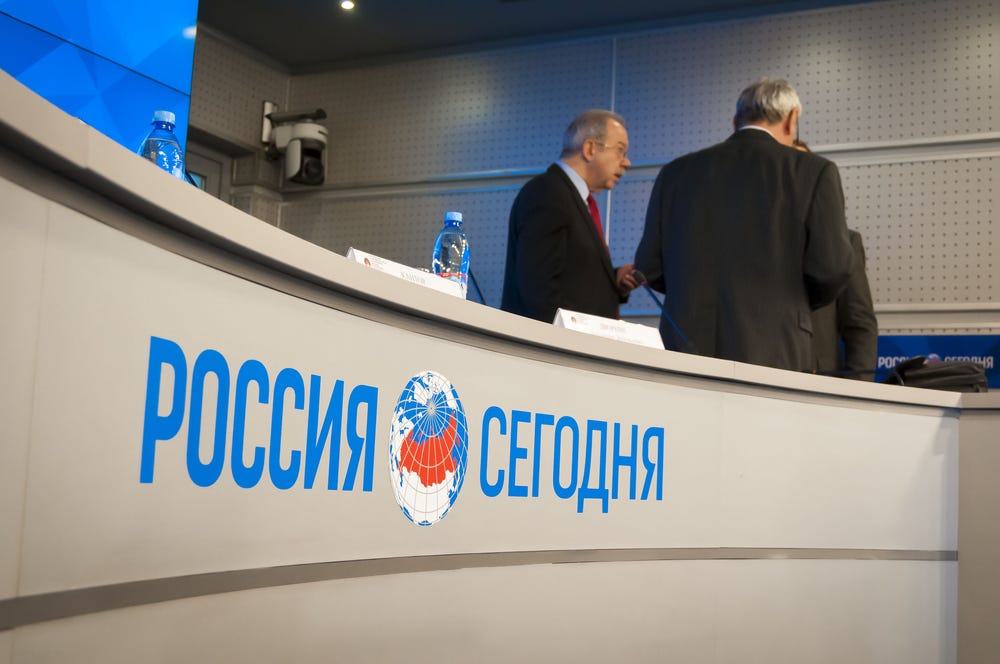E-Pluribus | March 18, 2022
The New York Times brings the free speech debate to the forefront; surprising no one, Russian media chooses sides against Ukraine; and a good way to spoil movie reviews.
A round up of the latest and best writing and musings on the rise of illiberalism in the public discourse:
New York Times Editorial Board: America Has a Free Speech Problem
Today, the New York Times editorial board sounds the alarm on free speech and announces a special focus for the coming months on the problem and possible solutions. (Predictably, the Times’s thesis is causing some wild reactions on Twitter, and some reasonable ones, that we have collected here.) The editorial is a response to poll commissioned by the board that clearly shows widespread belief cutting across the political, social and cultural spectrum that free speech is indeed at risk.
How has this happened? In large part, it’s because the political left and the right are caught in a destructive loop of condemnation and recrimination around “cancel culture.” Many on the left refuse to acknowledge that cancel culture exists at all, believing that those who complain about it are offering cover for bigots to peddle hate speech. Many on the right, for all their braying about cancel culture, have embraced an even more extreme version of censoriousness as a bulwark against a rapidly changing society, with laws that would ban books, stifle teachers and discourage open discussion in classrooms.
Many Americans are understandably confused, then, about what they can say and where they can say it. People should be able to put forward viewpoints, ask questions and make mistakes, and take unpopular but good-faith positions on issues that society is still working through — all without fearing cancellation.
However you define cancel culture, Americans know it exists, and feel its burden. In a new national poll commissioned by Times Opinion and Siena College, only 34 percent of Americans said they believed that all Americans enjoyed freedom of speech completely. The poll found that 84 percent of adults said it is a “very serious” or “somewhat serious” problem that some Americans do not speak freely in everyday situations because of fear of retaliation or harsh criticism.
Read it all.
Charles H. Fairbanks Jr.: Media Is Another Battleground in the Ukraine War
It almost seems a given that the Russian media would parrot Vladimir Putin’s line on Ukraine, but Charles Fairbanks’ examination of the way this plays out in war coverage is still useful in the larger context of the role of the media in society. When media sources are limited by either a government or consumers themselves, clearly false or distorted narratives can suddenly sound plausible.
Taking their instructions from Putin, Russian TV channels have routinely justified the Ukrainian invasion as necessary to stop the “genocide” of the “Russians” in the Donetsk and Luhansk People’s Republics—Russian-speaking provinces that Russia alone recognizes as sovereign states. Rossiya24, the Russian state news channel, went so far as to affix a label in the corner of every broadcast, day after day: “special operation in defense of the Donetsk People’s Republic and Luhansk P.R.” This label disappeared on March 6, but the station’s war coverage has continued to focus on this region. Its footage typically features ordinary people from these provinces standing atop the rubble of bombed buildings and complaining about Ukrainian shelling. But around the fringe of the ruins are green moss and grass, raising the question whether these ruins are really the result of recent Ukrainian attacks.
More pertinently, even as Russian TV coverage ignores the war outside the two “republics,” granite-faced military spokesmen openly boast, on air, about the thousands of “military objects” destroyed all over the country—basically admitting that this is indeed a big war spanning all of Ukraine, not some surgical strike against a defined target.
Another glaring contradiction in the public justification of the war is that although Putin insists that the Russians and Ukrainians are one people—brothers!—there is no suggestion of building a bridge to them. Instead, the tone of the coverage is shrill self-pity and paranoid hostility toward all those living outside Russia, including Ukrainians.
Beyond such contradictions and inconsistencies, Russian TV peddles lies—both of commission and omission. Russian TV accuses Ukrainians not only of genocide but of other sins, too, such as trying to acquire nuclear weapons with America’s help. Never mind that Ukraine handed all the nuclear weapons in its possession back to Russia in 1996 after it received security assurances from that country as well as from the U.S. and U.K. Russia is also accusing Ukraine of preparing for biowar, again with America’s backing. Russian documentaries constantly remind viewers about Ukrainian cooperation with Germans in 1918 and, subsequently, the Nazis. This last part is not completely false, but the rest is.
Read it all here.
Kyle Smith: ‘Racist’ Critic Forced to Cower for Innocuous Review
At National Review, Kyle Smith writes that dumb opinions need not and should not be conflated with racist ones. Smith relates an incident involving a review of the new Pixar feature Turning Red that raised howls of protest and resulted in the review’s retraction and an abject apology from the writer and from the movie website’s editor. Such pile-ons are not only unfair to the targets but make honest movie reviews all that much more difficult.
The kind of people who love to cry racism cried racism, again. Cinemablend predictably cowered and apologized, as did O’Connell. Cinemablend editor in chief Mack Rawden: “We failed to properly edit this review, and it never should have gone up. We have unpublished it and assigned to someone else. We have also added new levels of editorial oversight. Thank you to everyone who spoke up.” O’Connell: “I’m genuinely sorry for my ‘Turning Red’ review. Thank you to everyone who has reached out with criticism, no matter how harsh. It is clear that I didn’t engage nearly enough with the movie, nor did I explain my point of view well, at all. I really appreciate your feedback.”
Those who hurl themselves at the feet of their attackers and beg for forgiveness instead of defending themselves against spurious charges are making the once-prized culture of pluralism of opinion a little bit worse each day, and so it’s hard to muster much sympathy here. Rawden should have defended the principle that O’Connell should write what he thinks, and O’Connell should have rejected the bogus charge of racism. Instead he tacitly conceded his critics’ point. The ravening mob is rarely appeased by offering to let it have one of your limbs to eat.
No one should be offended by the review. There’s no hatred in it. O’Connell was simply trying to be honest about why the film didn’t grab him. But when it comes to race, any discussion that doesn’t repeat the approved catechism gets labeled racist. Crying racism is rewarding: Even the most shrill and least justified claims provide great self-righteous satisfaction, in addition to guaranteeing attention from journalists. But as every parent knows, indignant tantrums should not be indulged.
If you get the sense that you can’t trust reviews of anything anymore because critics are terrified of departing from orthodoxy on any subject that might trigger the way-too-online Left, I’d say you’re approximately 100 percent right.
Read it all.
Legends of Dissent, Frederick Douglass, part 5 - the conclusion
Here’s the fifth and final installment in our new graphic vignette feature, Legends of Dissent: Frederick Douglass at the Tremont. As always, we welcome your feedback.
In Case You Missed It
In this week’s Kowtow Chronicles, the New York Times tries to finesse its inadequate disclosure of a guest essayist’s connections to the Chinese government.
Around Twitter
As mentioned above, today’s New York Times editorial is creating quite a stir on Twitter. Below is how the Times introduced its piece on Twitter, and here’s a link to the reactions we have aggregated.










Via Aaron Sibarium, stemming from an incident we featured yesterday (item #1) that Sibarium reported, this development is sure to raise questions regarding how far consequences should go, especially when the actions of young people are involved:


Via David Leonhardt, some interesting findings on how political leanings affect perceptions of all things COVID. (Click for the whole thread.)




And finally, of all the reactions to the New York Times’s late-to-the-party acknowledgement of the Hunter Biden laptop and emails… this is one of them:









